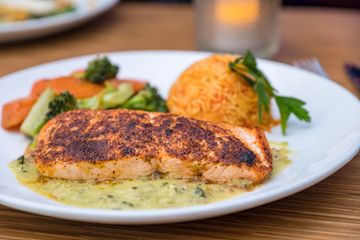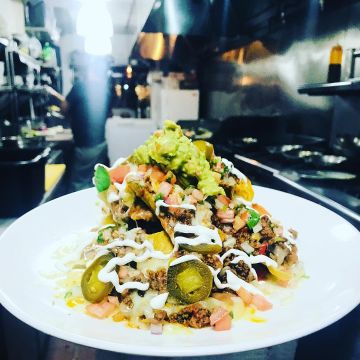Choose best mexican westchester NY cantinas for vibrant cuisine
Wiki Article
Is Mexican Food Healthy? Unloading the Nutritional Conveniences of Conventional Ingredients
The question of whether Mexican food is healthy invites an exploration of its typical ingredients. Beans and corn work as fundamental staples, rich in protein and fiber. Avocados offer useful fats, while numerous herbs and seasonings include taste and health and wellness advantages - hand crafted margarita. With each other, these parts produce a tapestry of nourishment. The healthfulness of Mexican cuisine typically depends on preparation approaches and section dimensions. What function do these factors play in establishing its overall dietary value?The Power of Beans: Healthy Protein and Fiber-Rich Staples
Frequently overlooked, beans offer as a foundation of Mexican food, providing a wide range of dietary benefits. Rich in healthy protein, they are an outstanding plant-based choice for those looking for to fulfill their dietary protein requires. This high healthy protein content sustains muscular tissue repair and development, making beans very useful for both meat-eaters and vegetarians alike. Furthermore, beans are a remarkable resource of nutritional fiber, which assists in digestion and advertises a feeling of volume, possibly aiding with weight monitoring.The range of beans used in Mexican dishes, such as black beans, pinto beans, and kidney beans, adds to a diverse flavor profile and can boost dishes nutritionally. Beans are reduced in fat and consist of essential vitamins and minerals, including magnesium, folate, and iron. Together, these features make beans an important active ingredient, providing both nourishment and nutrition in typical Mexican price.

Corn: a Versatile Grain With Nutritional Perks
Corn attracts attention as a versatile grain essential to Mexican food, commemorated not just for its cooking applications however also for its outstanding nutritional profile. As a key ingredient in recipes like tortillas, tamales, and pozole, corn gives essential nutrients that add to a balanced diet plan. Rich in carbs, it functions as a significant energy source, while also being low in fat, making it a positive option for various dietary demands.In addition, corn is a great resource of nutritional fiber, which aids in digestion and promotes satiety. It contains considerable quantities of vitamins such as B-complex vitamins, which are crucial for energy metabolic process. The visibility of anti-oxidants, specifically carotenoids, adds to total wellness by decreasing oxidative stress. Furthermore, corn is gluten-free, providing to those with gluten sensitivities. In general, the dietary advantages of corn highlight its value in traditional Mexican food and its role in a healthy diet.
Avocados: Healthy Fats and Nutrients in Every Bite
Avocados play a substantial duty in Mexican food, complementing meals with their velvety texture and abundant flavor. Past their cooking charm, avocados are commemorated for their outstanding nutritional profile. They are a rich source of healthy and balanced monounsaturated fats, which can assist reduced negative cholesterol degrees and assistance heart health and wellness. Furthermore, avocados are packed with important vitamins and minerals, including potassium, vitamin E, and B vitamins, contributing to overall wellness.The high fiber web content in avocados aids food digestion and promotes satiation, making them a beneficial addition to any dish. Their special nutrient make-up can also support skin health and offer anti-inflammatory benefits. Integrating avocados into conventional Mexican dishes or enjoying them as a standalone treat can enhance both flavor and nutrition, showing why they are a precious staple in Mexican try this site cuisine. In general, avocados provide a delicious means to delight in healthy fats and vital nutrients in every bite.

Herbs and spices: Flavorful Health Boosters
While delighting in the abundant tastes of Mexican food, one can not forget the essential role that spices and herbs play in enhancing both preference and health. Ingredients such as chili, oregano, and cilantro peppers not only contribute to the lively taste account but likewise give substantial wellness benefits. Cilantro is understood for its purifying buildings, helping to eliminate hefty steels from the body, while oregano is loaded with antioxidants and possesses anti-inflammatory impacts.Chili peppers, a staple in many Mexican meals, contain capsaicin, which has been linked to improved metabolism and discomfort relief. Furthermore, seasonings like cumin and coriander support digestion and might aid in blood sugar level law. Incorporating these flavorful health and wellness boosters into meals not just improves the culinary experience yet likewise advertises total wellness, making Mexican cuisine not just tasty, yet also nutritionally advantageous.
Typical Food Preparation Approaches: Enhancing Nutrition and Taste
Traditional food preparation approaches in Mexican food play a crucial role in improving both nutrition and flavor, as they often prioritize fresh active ingredients and classic techniques. Methods such as nixtamalization, where corn is saturated and cooked in an alkaline service, not just enhance the nutrient profile of tortillas yet additionally improve their digestibility - tacos. Additionally, the use of slow food preparation approaches, like stewing or braising, permits flavors to fuse magnificently while keeping the integrity of the active ingredients
Often Asked Concerns
Are Mexican Food Portions Generally Larger Than Various Other Cuisines?
Mexican food sections are usually larger than those of numerous other cuisines. This characteristic reflects traditional dining techniques, highlighting common sharing and hearty meals, which can cause an extra substantial offering dimension generally.
Exactly how Does the Preparation Technique Affect Healthfulness of Mexican Food?
Prep work techniques greatly influence the healthfulness of Mexican food. Strategies such as grilling or steaming preserve nutrients, while frying can boost undesirable fat material. Selections of ingredients and cooking styles ultimately identify overall dietary value.Can Mexican Food Be Tailored for Specific Nutritional Restrictions?
Mexican food can indeed be tailored for specific dietary restrictions. Alternatives, such as using corn tortillas for gluten-free diets or incorporating panera hours even more veggies, enable individuals to enjoy traditional flavors while suiting various nutritional requirements.What Prevail Misconceptions About Mexican Food and Wellness?
Common misconceptions regarding Mexican food include the belief that it is naturally unhealthy, excessively spicy, and solely concentrated on fats. In truth, standard meals often feature nutritious active ingredients and can be customized to numerous nutritional needs.Are There Healthier Alternatives at Mexican Dining Establishments?
Much healthier choices at Mexican restaurants frequently include barbequed meats, beans, and fresh veggies. Selecting dishes that highlight entire active ingredients and avoiding heavy sauces can result in a much more nourishing eating experience, advertising overall well-being.The range of beans utilized in Mexican dishes, such as black beans, pinto beans, and kidney beans, contributes to a varied taste profile and can boost meals nutritionally. Avocados play a substantial role in Mexican food, enhancing dishes with their luscious structure and rich flavor. Incorporating avocados into traditional Mexican meals or enjoying them as a Homepage standalone snack can improve both flavor and nutrition, showing why they are a beloved staple in Mexican cuisine. While delighting in the rich tastes of Mexican food, one can not neglect the necessary duty that spices and natural herbs play in improving both preference and health and wellness. Standard food preparation approaches in Mexican food play a crucial duty in boosting both nutrition and taste, as they often prioritize fresh components and time-honored strategies.
Report this wiki page